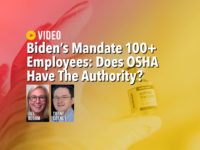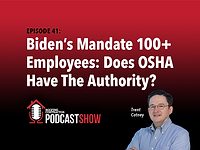Construction Associations Say Vaccine Mandate Will Have ‘Significant Implications’ for Industry

Image by F. Muhammad from Pixabay.
A coalition of construction associations is ensuring the industry’s concerns are heard after the Occupational Safety and Health Administration (OSHA) revealed it won’t take public comment on its COVID-19 vaccine mandate enforcement.
A letter sent to OSHA by the Construction Industry Safety Coalition, made up of 26 industry associations including the National Roofing Contractors Association (NRCA), expressed concerns over the decision to issue an emergency temporary standard (ETS) through OSHA to enforce the Biden administration’s latest efforts to combat the COVID-19 pandemic.
On Sept. 9, President Joe Biden revealed a COVID-19 Action Plan that included requiring employers with 100 or more employees to have their workforce vaccinated or undergo regular COVID-19 testing. The plan also calls for those same employers to provide paid time off for workers to get vaccinated or to recover from vaccine side effects.
The plan provides few details about how OSHA will implement these mandates, and OSHA indicated it will develop the ETS without any opportunity for formal public comment.
"Even a short comment period would allow stakeholders with experience with vaccinations and testing to provide information to OSHA, which would be very valuable as OSHA considers the ETS," the coalition's letter states.
Philip Siegel, a partner and shareholder with the firm Hendrick, Phillips, Salzman & Siegel, writes that once an ETS is published in the Federal Register, it becomes effective immediately and may be in place for up to six months.
Questions on Regulation
To issue an ETS, Siegel said OSHA must first determine “that employees are exposed to grave danger from exposure to substances or agents determined to be toxic or physically harmful or from new hazards,” and “that such emergency standard is necessary to protect employees from such danger.”
The coalition claims OSHA cannot show that the construction industry meets the “grave danger” condition. It points to OSHA’s own assessment that the industry has “low exposure risk” since its workforce has minimal occupational contact with the general public or other coworkers.
“Indeed, the low-risk nature of construction work was further recognized in the recent CDC guidance on vaccine booster shots,” the letter states, adding construction was not included in the list of occupations that should receive a booster.
The coalition raises questions on how OSHA will determine who is responsible to pay for weekly COVID-19 testing and how the agency will require employers to document vaccines or weekly testing. The letter also expresses concerns that the ETS will worsen the ongoing labor shortage in an industry with high vaccine hesitancy and may have a “significant economic impact” due to employers providing paid time off on top of paying for weekly testing.
“OSHA must ensure that it fully considers all of the very difficult issues involved in implementing the Plan through an ETS,” the letter states.
Regardless of its objections, the coalition is in support of Biden’s efforts to increase vaccinations among the population and has taken steps to increase awareness of the vaccines. These efforts include the development of a COVID-19 Exposure Prevention Preparedness and Response Plan and participating in the CDC’s Vaccine Awareness Week in Construction.
What Contractors Can Do
Siegel advises construction employers to check with their workforce now to determine which of its employees are vaccinated. The law permits employers to ask whether their employees are vaccinated in this circumstance, but they cannot ask unvaccinated employees why they aren’t vaccinated.
“Litigation is sure to follow the publication of OSHA’s anticipated emergency temporary standard,” Siegel said.
Not complying with the ETS could be costly. Siegel says when published, those not in compliance will face penalties of up to $13,653 per “serious” violation and up to $136,532 per “willful” violation.
Federal contractors are required to be vaccinated and do not have a testing alternative. The deadline for federal contractors to be vaccinated is Dec. 8. Trent Cotney, CEO of Cotney Attorneys & Consultants, said there’s not much federal contractors can do at this point.
“There aren’t any loopholes, you’ve got to do it,” said Cotney. “It is a federal mandate, it is coming up quick — December doesn’t seem like it’s far away, but it’s going to be here like 'that!', so a lot of contractors are very concerned.”
Looking for a reprint of this article?
From high-res PDFs to custom plaques, order your copy today!






